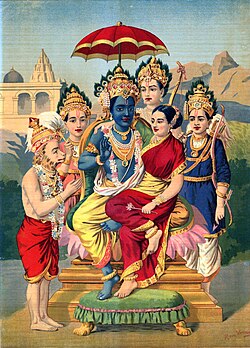 First edition | |
| Author | C. Rajagopalachari |
|---|---|
| Genre | Mythology |
| Publisher | Bharatiya Vidya Bhavan |
Publication date | 1957 |
| Publication place | India |
| Media type | |
| ISBN | 978-81-7276-365-7 |
| OCLC | 19243018 |
Ramayana is a retelling of the epic by C. Rajagopalachari. It was first published by Bharatiya Vidya Bhavan in 1957. [1] This book is an abridged English retelling of the Valmiki Ramayana ; he had earlier published a version of Kamba Ramayanam . [2] Rajaji considered this book and his Mahabharata to be his greatest service to his countrymen.[ citation needed ]
As of 2001, the book had sold over a million copies. [3]
